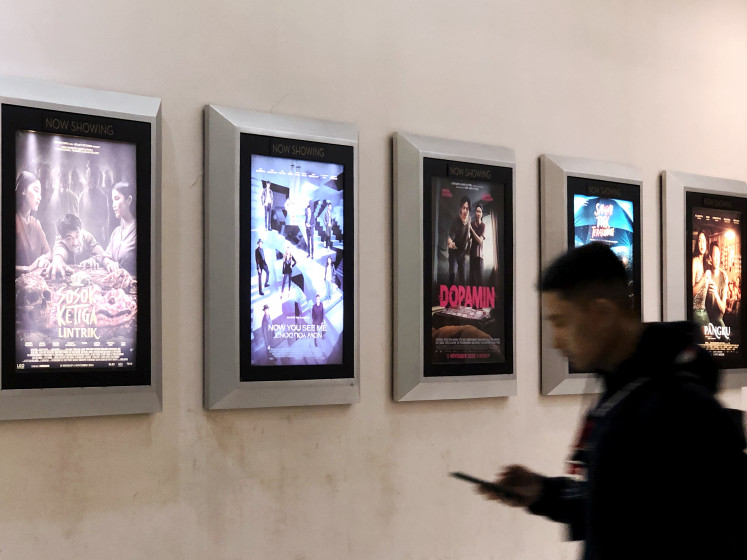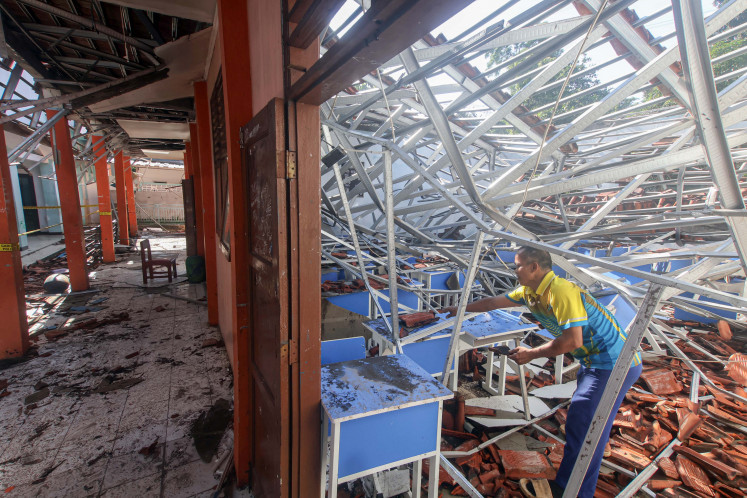Popular Reads
Top Results
Can't find what you're looking for?
View all search resultsPopular Reads
Top Results
Can't find what you're looking for?
View all search resultsKey ministers discuss trust, loyalty under President Jokowi
With infrastructure development one of President Joko “Jokowi” Widodo’s key programs, one could be forgiven for thinking that key ministers tasked with executing the President’s vision are feeling the stress
Change text size
Gift Premium Articles
to Anyone
W
ith infrastructure development one of President Joko “Jokowi” Widodo’s key programs, one could be forgiven for thinking that key ministers tasked with executing the President’s vision are feeling the stress.
However, Transportation Minister Budi Karya Sumadi and Public Works and Housing Minister Basuki Hadimuljono were having none of it, with both saying they were reveling in Jokowi’s challenge to vastly improve Indonesia’s infrastructure to better connect regions of the sprawling archipelago.
In a recent discussion in Jakarta, Basuki said he enjoyed working with Jokowi to implement the call for improved infrastructure. “It is enjoyable [working with Jokowi], because he fully trusts us. In work, I believe in two [principles]: trust and loyalty. He trusts me, I am loyal [to Jokowi],” said Basuki.
As for Budi, he was particularly motivated by Jokowi’s demanding target, saying this gave him additional drive to rise to the challenge.
“The work is challenging, [but] because it is challenging, we have to put up an all-out effort,” said Budi, pointing to his recent task to oversee the airport expansion and construction projects for five priority tourism destinations.
The government has set aside a total of Rp 1.73 quadrillion (US$122.96 billion) between 2015 and 2019 to finance its infrastructure projects, with the infrastructure budget increased year over year during Jokowi’s first term.
In the 2019 state budget, the Public Works and Housing Ministry took up the largest chunk of the infrastructure budget with Rp 108.2 trillion out of a total Rp 415 trillion budgeted for infrastructure, while the Transportation Ministry got Rp 38.1 trillion.
At the same forum, Jokowi reiterated that improving Indonesia’s infrastructure was a fundamental requirement for Indonesia to compete with its neighbors.
“[With] infrastructure, we are creating jobs. We also will create a new source of economic growth, and it will also improve our logistics networks, because we are a country of more than 17,000 islands,” said Jokowi.
Going forward, the government would focus on connecting backbone infrastructure with tourist destinations and production centers across the country, Jokowi said.
“For example, the airport in Labuan Bajo [West Nusa Tenggara] should be connected with tourist destinations in the areas surrounding the airport. The roads should be widened and connected with other spots,” said Jokowi.
While Jokowi has said that human capital development would be his administration’s priority for 2020, the government remained aggressive in its infrastructure development.
Data from the Public Works and Housing Ministry reveal that the government aims to build 2,500 kilometers new toll roads, 3,000 km of new roads, 60 dams and 50,000 low-cost apartments, among other targets, between 2020 and 2024.
The Transportation Ministry, meanwhile, was targeting to build nine new airports, among other projects, between 2020 and 2024.
According to the ministry’s data, total investment in the transportation sector was estimated to reach Rp 1.28 quadrillion over the period, with the government and state-owned enterprises expected to chip in Rp 236 trillion and Rp 351 trillion, respectively, while the private sector was targeted to shoulder the remaining Rp 702 trillion.
Center of Reform on Economics (CORE) Indonesia researcher Yusuf Rendy Manilet said the government should ensure that its infrastructure drive would benefit industrial zones if it wanted to create new sources of economic growth, adding that the government should also ensure smooth land acquisition to allow for swift infrastructure development.
“One of the problems in infrastructure development in the past five years has been the slow process of land acquisition,” said the CORE researcher.
“The government needs to map land already owned by them and calculate the cost of land acquisition for infrastructure development. This task could be carried out by the State Asset Management Agency.”










